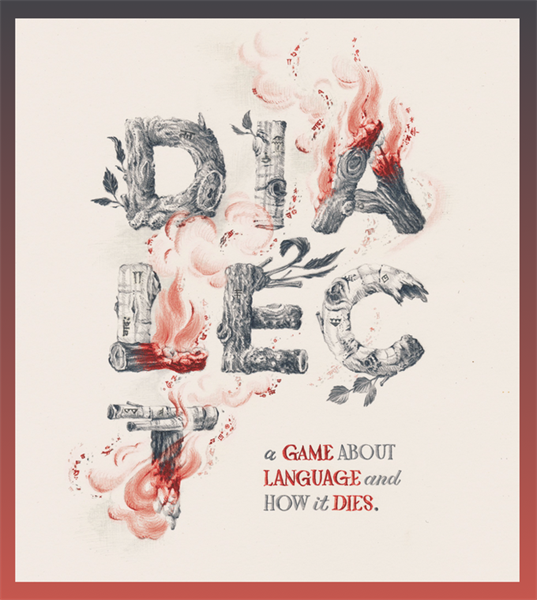I got to play Dialect at IndieCON, although only one of the three phases of play, so these thoughts are certainly tentative. I haven’t read the rules either.
“It’s the game about the rise and fall of a language!” True as far as it goes, but that’s a stalking horse, good at drawing people in out of interest – one step short of a gimmick, given that the content thereof is real and important, but definitely not “what it’s about.” If it said what it’s about, no one would play.
Some of the points I’d like to make are better reserved for more private space, which in this case I will designate as the patrons (with acknowledged self-interest). As I hint in the video, I have insider knowledge of more than one community of the type that the game is about, and also of the greyer boundary-almost communities which were extremely common in the U.S. I was never a “cult member” in the ordinary sense of the term, but … well, anyway – I’ll put up a video at the Patreon, in a little while.
Not much to say here that I didn’t in the video, but attached is my brief list of concepts and terms that we used in play.


3 responses to “That’s a Wheel”
Dialogue on Dialect
I’ve not played or read Dialect (apart from the opening pages), but it’s a game that keeps appearing on the radar. Given the chance, I’d dive in.
I’ve listened to at least one actual play of the game, and I’ve encountered a number of discussions of it. In the case of the actual play, the players took the community into a more isolated situation than was your case at IndieCon. As I recall, that particular game involved aspects of interplanetary travel, and the community was located in a large multi-layer subsurface structure. In this case, communication with outside groups was minimal. So the language and wider culture of the separated group were more completely cut off and isolated. That would certainly change the flavor of the game experience. In your case, the “Wheelies” were living within a broader culture, so they would have a sense that their separation was a willed one. The awareness of that choice would be an ongoing daily occurrence. By contrast, if you’ve taken your group to a distant planet, you made a choice, but once you leave and land on the planet, there is a greater sense of finality to that decision. The rules even allow for communities where the isolation is forced upon the group. So the game allows for a wide array of experiences. I would imagine that a player’s sense of what the game is about would change depending upon some of those key world-building decisions. I’ll look forward to the ongoing discussion of the game.
I am curious about the time frame and the tragic default tone. I think most groups try to play Dialect as a one-shot: The description of the game says 3-4 hours. But given what the game involves, it seems like that’s a heap to accomplish in a short period.
I can’t imagine 3-4 hours
I can't imagine 3-4 hours unless there were a person exerting considerable control over pacing, or all of us were. At the risk of anticipating too much, as I don't know the text very well either, I'm pretty sure I wouldn't want that kind of pacing for a game which benefits from a "sinking in," reflective quality about the situations and values.
In examining real-play accounts, I plan to pay attention to how much in-fiction description and play occurs. It carries a discernible risk of "let's have a conflict between my guy A and your guy B, about X." "OK! It can be about this or that fictional situation concerning X." "Cool. A would say this." "How about if A says that instead?" "OK, A says that then." "Well, B would say this, and I guess that could cause problems of this or that sort." "Cool." Then it's someone else's turn, and the previous turn is perceived as something happening, but nothing that could be called play happened.
I'm not claiming this actually happens with Dialect, as I haven't been monitoring or seeking play accounts, but it does happen at many tables using games with similar structures, particularly when convention or get-together one-shots are involved. I bring it up here because this phenomenon represents another way for play to go quickly.
The group makes lots of
The group makes lots of choices at the start to set up the community's parameters. The degree of isolation, however, may be rather less open than phrases like "we live on a colony planet far far away" would imply. That's because the larger society may play an intrusive role during the third phase especially, and possibly earlier. I don't have all the options and cue phrases memorized, but the ones I did see concern agents provocateurs and physical crackdowns, along with internal stresses.
Therefore it's likely that although many of the possible community setup options may present an initial picture of this group of people escaping fully from "home," "home" is still out there, still considers this group to be part of it, and is soon to make its extremely powerful move. Saying it's a far-off planet or dimension or whatever merely extends the hegemony of the larger society to enclose that much more of reality.